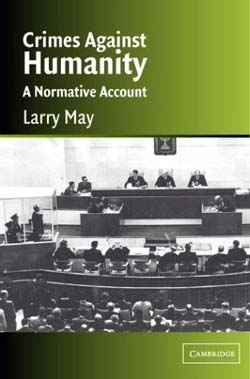(Cambridge University Press, November 2004)
Adapted from the book jacket:
Crimes Against Humanity: A Normative Account provides a philosophical analysis of some of the most difficult issues in international criminal law, especially why some crimes are properly thought to harm humanity and hence to be prosecutable in international tribunals.

The book focuses on the moral, legal and political questions that arise when individuals who commit mass or collective crimes, such as crimes against humanity, are held accountable by international criminal tribunals.
To be defensible, international criminal law must move beyond honoring the victims of horrific harms and must embrace norms that support an international rule of law. If international law is to achieve the respect and fidelity to law that is the hallmark of most domestic law settings, defendants’ rights must be given at least as much attention as victims’ rights.
The discussions in Crimes Against Humanity are a mixture of philosophical analysis and assessments of developments in international criminal law, including lengthy discussions of the Eichmann, Pinochet and Tadic cases.
“This book is the first attempt to lay out a normative theory that would support international prosecutions of the sort that are occurring in international criminal courts in the Hague and Arusha,” said May, an expert in moral and legal responsibility as well as international criminal law.
“To do so, I defend a more limited role for such international criminal courts than many defenders of these courts would like, but I do provide a grounding for these courts, nonetheless contrary to the current position of the United States government, which opposes the new International Criminal Court.”
The book is the first of a projected three-volume set. The second book will be called War Crimes and Just Wars and the third will be Crimes Against Peace and Unjust Wars.